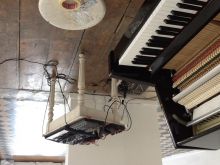|
Alejandro Petrasso est un virtuoso du piano, entre autres élève de Martha Argerich.
À ZSenne, il entame un nouvelle recherche, dans le prolongement de son passage par a•pass
"Je reste fasciné par les concepts d'Apparition et Disparition, et aujourd'hui je poursuis mes recherches à propos des Hallucinations Musicales et de la surdité :
'Musical hallucinosis est un désordre du traitement des sons complexes. Les sujets perçoivent les sons complexes comme étant de la musique, sans qu'il n'y ait de stimulus acoustique.'
Les Hallucinations Musicales surviennent principalement chez des sujets souffrant de surdité acquise, modérée à sévère."
Ce projet continuera l'année prochaine.
|
Alejandro Petrasso is pianovirtuoos, leerling van o.a. Martha Argerich.
In ZSenne begint hij aan een nieuw onderzoek, dat aansluit bij zijn passage in a•pass
"Ik ben nog steeds gefascineerd door de concepten van Afwezigheid en Verdwijning en nu doe ik onderzoek naar Muzikale Hallucinaties voor doven:
'Muzikale hallucinaties is een disfunctie van het verwerken van complexe geluiden. Die personen horen complexe geluiden in de vorm van muziek zonder dat er een akoestische stimulus aanwezig is.'
Muzikale Hallucinaties komt meestal voor bij personen met beginnende of erge doofheid, die niet aangeboren is, maar later ontstaat."
Wordt volgend jaar verdergezet.
|





